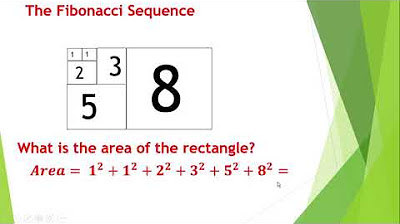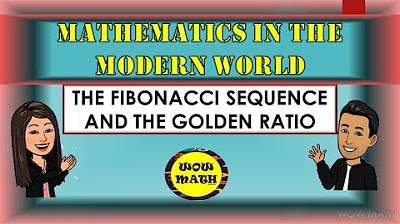What is the Fibonacci Sequence & the Golden Ratio? Simple Explanation and Examples in Everyday Life
Summary
TLDRThe Fibonacci sequence, a series where each number is the sum of the two preceding ones, is found in nature, art, and architecture. This sequence, named after Leonardo Fibonacci, has been traced back to ancient Indian texts and was popularized in the West through his book 'Liber Abaci.' It's closely related to the golden ratio (approximately 1.618033), which is seen in various natural forms like seashells and in human-made structures. The golden spiral, a logarithmic spiral expanding by the golden ratio with each turn, is another manifestation of these mathematical concepts, observed in phenomena like ocean waves and in the works of artists like Salvador Dali.
Takeaways
- 🌼 Many flowers have a number of petals that are Fibonacci numbers, such as 3, 5, 8, 13, 21.
- 🌱 The arrangement of leaves on cacti and seeds in sunflowers often follows the Fibonacci sequence in both left- and right-handed spirals.
- 🤲 The human hand, with 2 hands of 5 fingers each, and each finger divided into 3 parts, exhibits Fibonacci numbers in its structure.
- 📐 The Fibonacci sequence is a series where each number is the sum of the two preceding ones, starting with 0, 1, 1, 2, 3, and so on.
- 🧮 The sequence is named after Leonardo Fibonacci, a medieval mathematician who introduced the Hindu-Arabic numeral system to the Western world through his book Liber Abaci.
- 📘 The Fibonacci sequence has been known since at least the 6th century in ancient Indian texts, predating Fibonacci's work.
- 🔢 The sequence is mathematically represented by the formula F(n) = F(n-1) + F(n-2) for n > 1.
- 🌟 The Fibonacci sequence is closely related to the golden ratio (phi, ϕ), approximately 1.618033, which is a ratio of two consecutive Fibonacci numbers as they get larger.
- 🐚 The golden spiral, formed by applying the golden ratio as a growth factor, is seen in many natural phenomena like seashells, ocean waves, and hurricanes.
- 🏛 The golden ratio and spirals are used in art, architecture, and design, including works by Salvador Dali and the architectural principles of Le Corbusier.
Q & A
What is the significance of the Fibonacci sequence in nature?
-The Fibonacci sequence is significant in nature as it appears in the arrangement of petals, leaves, and seeds in various plants, often following the sequence's pattern. This can be observed in the number of petals on a flower, the arrangement of leaves on cacti, and the spiral patterns in sunflowers.
How is the Fibonacci sequence defined mathematically?
-Mathematically, the Fibonacci sequence is defined by the formula F(n) = F(n-1) + F(n-2), where n is greater than 1. This means each number in the sequence is the sum of the two preceding numbers, starting with 0 and 1.
Who is credited with popularizing the Fibonacci sequence in the Western world?
-Leonardo Pisano, also known as Fibonacci, is credited with popularizing the Fibonacci sequence in the Western world through his book Liber Abaci, published in 1202.
What is the connection between the Fibonacci sequence and the golden ratio?
-The golden ratio is an offshoot of the Fibonacci sequence. As you progress through the sequence, the ratio of consecutive Fibonacci numbers converges to the golden ratio, which is approximately 1.618033.
What is the golden ratio, and how is it represented?
-The golden ratio is a special number, often represented by the Greek letter phi (ϕ), that arises when a line is divided in such a way that the ratio of the whole line to the longer part is equal to the ratio of the longer part to the shorter part. It is approximately equal to 1.618033.
How does the golden ratio manifest in geometry?
-In geometry, the golden ratio manifests as a growth factor in logarithmic spirals known as golden spirals. These spirals expand by a factor of phi with each quarter turn.
Where can the golden spiral be found in nature?
-Golden spirals can be found in various natural forms such as seashells, ocean waves, hurricanes, flower buds, snail shells, and spider webs.
How have artists and architects utilized the golden ratio or spiral?
-Artists like Salvador Dali have explicitly used the golden ratio in their works, such as The Sacrament of the Last Supper. Architects, including Le Corbusier, have incorporated the golden ratio into their designs for aesthetic and functional purposes.
What is the significance of the golden ratio in architecture?
-In architecture, the golden ratio is used to create aesthetically pleasing and harmonious designs. It is believed to contribute to the visual balance and proportion of buildings and structures.
Can you provide an example of how Fibonacci numbers relate to the human body?
-Fibonacci numbers relate to the human body in various ways, such as the number of fingers on each hand (5), the number of bones in each finger (3), and the proportions of bone lengths in the hand, which often follow Fibonacci numbers.
Why is the Fibonacci sequence considered ubiquitous in our everyday lives?
-The Fibonacci sequence is considered ubiquitous because it appears in various aspects of mathematics, nature, art, and architecture, often associated with patterns of growth and proportion that are aesthetically pleasing and functionally efficient.
Outlines

This section is available to paid users only. Please upgrade to access this part.
Upgrade NowMindmap

This section is available to paid users only. Please upgrade to access this part.
Upgrade NowKeywords

This section is available to paid users only. Please upgrade to access this part.
Upgrade NowHighlights

This section is available to paid users only. Please upgrade to access this part.
Upgrade NowTranscripts

This section is available to paid users only. Please upgrade to access this part.
Upgrade NowBrowse More Related Video
5.0 / 5 (0 votes)





